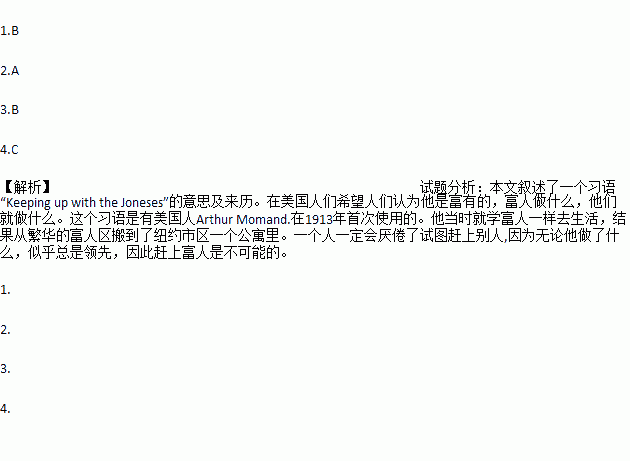题目内容
In the United States, when one becomes rich, he wants people to know it. And even if he does not become very rich, he wants people to think that he is. That is what “keeping up with the Joneses” is about. It is the story of someone who tried to look as rich as his neighbors.
The expression was first used in 1913 by a young American called Arthur Momand. He told this story about himself. He began earning $ 125 a week at the age of 23. That was a lot of money in those days. He got married and moved with his wife to a very wealthy neighborhood outside New York City. When he saw that rich people rode horses, Momand went horseback riding every day. When he saw that rich people had servants, Momand and his wife also hired a servant and gave big parties for their new neighbors.
It was like a race, but one could never finish his race because one was always trying to keep up. The race ended for Momand and his wife when they could no longer pay for their new way of life. They moved back to an apartment in New York City.
Momand looked around him and noticed that many people do things just to keep up with rich lifestyle of their neighbors. He saw the funny side of it and started to write a series of short stories. He called it “Keeping up with the Joneses” because “Jones” is a very common name in the United States. “Keeping up with the Joneses” came to mean keeping up with rich lifestyle of the people around you. Momand’s series appeared in different newspapers across the country for over 28 years.
People never seem to get tired of keeping up with the Joneses. And there are “Joneses” in every city of the world. But one must get tired of trying to keep up with the Joneses because no matter what one does, Mr. Jones always seems to be ahead.
1.Some people want to keep up with the Joneses because they .
A. want to be as rich as their neighbours
B. want others to know or to think that they are rich
C. don’t want others to know they are rich
D. want to be happy
2.It can be inferred from the story that rich people like to .
A. live outside New York City B. live in New York City
C. live in apartments D. have many neighbours
3.Arthur used the name “Jones” in his series of short stories because it is .
A. an important name B. a popular name in the United States
C. his neighbour’s name D. not a good name
4.According to the writer, it is to keep up with the Joneses.
A. correct B. interesting
C. impossible D. good
 开心练习课课练与单元检测系列答案
开心练习课课练与单元检测系列答案 开心试卷期末冲刺100分系列答案
开心试卷期末冲刺100分系列答案
